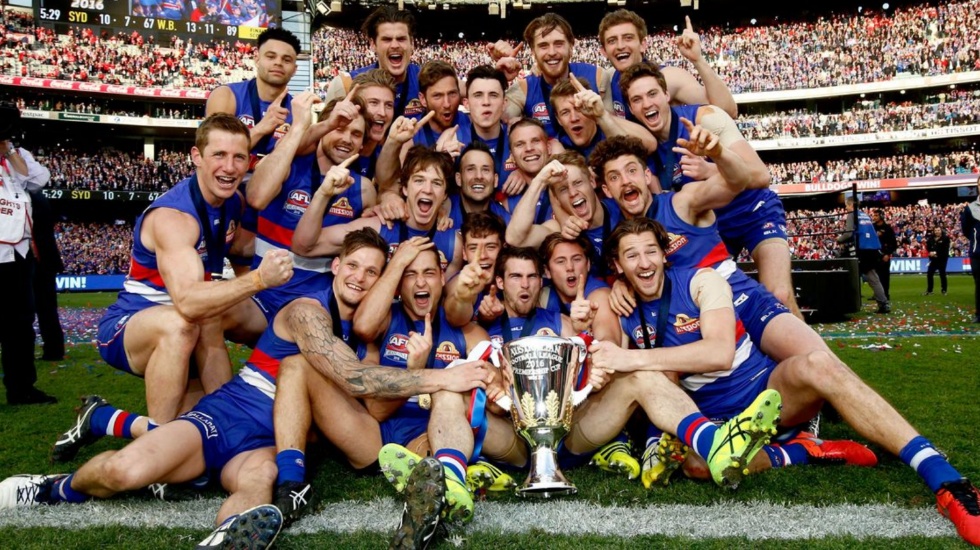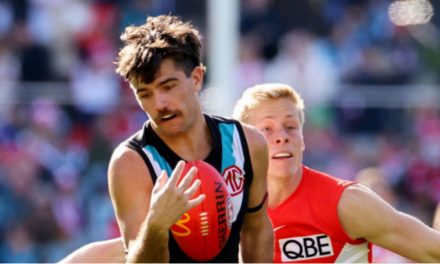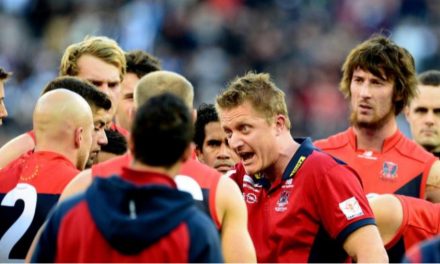The Western Bulldogs claimed arguably the most unlikely premiership in VFL/AFL history in 2016. Photo: AFL MEDIA
As New Zealand supermodel Rachel Hunter once said: “It may not happen overnight, but it will happen.”
The expansion of the AFL’s current top eight finals system is inevitable, whether that be via the introduction of a wildcard weekend which features the ninth and/or 10th team(s), or the establishment of a fully blown top 10.
And while it may not occur next year, or the year after that, the simple reason why it will/should happen is that the league is set to welcome a 19th team from Tasmania in 2028, and perhaps a 20th team shortly after.
You can’t possibly have a league where only eight out of 19 or 20 teams qualify for the finals, can you? The season would lose meaning very quickly for teams slugging it out in the middle of the ladder.
Surely the season needs to retain as much interest for as long as possible for clubs, their players, and, most importantly, their fans.
The VFL certainly understood that this year, and after having a top eight for its bloated 21-team competition in 2022, expanded to a wildcard system this season where seventh plays 10th, and eighth plays ninth for the final two elimination final spots.
After news broke earlier this week that incoming AFL CEO Andrew Dillon would speak to club chiefs about the introduction of a wildcard weekend, amongst other things, it seems the concept is slowly but surely gathering more momentum.
The cynics would say it’s just a naked a cash-grab from the league, as a wildcard weekend would no doubt generate a sizeable chunk of revenue but that the integrity of the competition would be further eroded.
Some would also bemoan the further ‘Americanisation’ of the indigenous Australian game, given the NFL also has a wildcard system, while the NBA recently introduced a play-in tournament.
For what it’s worth, this writer’s stance on the idea has oscillated over the years.
For the most part, I have been in favour of the introduction of a wildcard weekend, especially if Dillon insists on preserving the god-awful pre-finals bye weekend his predecessor Gillon McLachlan introduced. It remains extremely unpopular one of the great kneejerk overreactions in recent AFL history (which is saying something).
And I’ll admit, in the last couple of seasons, I have had more of an appreciation of the counterargument which pretty much contends that given how tight the competition has become, the final few rounds of the season are like virtual wildcard weekends or quasi finals matches anyway.
Take last year for example.
Heading into Round 23, the Western Bulldogs (ninth) and St Kilda (10th) were still alive in the finals race, and the Dogs ultimately replaced Carlton in one of the greatest and most dramatic final days of a season in VFL/AFL history.
Who could forget Collingwood’s sensational comeback from four goals down to beat the Blues by a point which ensured the Bulldogs grabbed eighth spot by 0.6 per cent?
Carlton would become the first team in over 40 years to let slip a finals spot in the last round after occupying one every other week of the season.
And when you look at this year’s ladder, it would come as no shock at all if we were treated to even more spectacular fireworks in the final round with just two games separating fifth and 14th after 18 rounds.
PLEASE HELP US CONTINUE TO THRIVE BY BECOMING AN OFFICIAL FOOTYOLOGY PATRON. JUST CLICK THIS LINK.
However, when all is said and done, the prospect of one or two standalone matches at the completion of the home-and-away season, whether it be eighth v ninth or seventh v 10th and eighth v ninth, to decide the make-up of the final eight is too exciting and tantalising to pass up.
Using the Round 18 ladder as a guide, you’d have the Western Bulldogs taking on Carlton and Essendon facing GWS in front of packed houses at the MCG. It would be tremendous.
Concerns of the purists who fear it would be another unnecessary change to the sport that further chips away at its uniqueness in a global context are understandable, after all I consider myself to be a traditionalist on most issues regarding our great Australian game.
But it should also be noted the VFL/AFL finals systems has evolved many times throughout history and undergone numerous iterations.
There were six variations of the top four in the first 75 years of the league, a top five for the next 19 years, two versions of the top six in the space of three years between 1991-93, the first top-eight system in 1994, and the current top-eight system which was adopted in 2000.
Critics also argue that a top 10 for 18 or 19 teams would reward mediocrity as more than half of the league would get the opportunity to play finals, but let’s not forget that in 1994, there was a top eight for 15 teams. Furthermore, that same year, in the first week of the finals, eighth-placed Collingwood lost to top-ranked West Coast by a goal, and Melbourne (seventh) defeated Carlton (second) in a massive boilover.
Granted, lower-ranked teams making it deep into a finals series is rare, and it’s another point stressed by those who want to retain the top eight. But it does happen, and surely that’s enough justification to eventually expand to a top 10.
Outside of the most obvious example of the Bulldogs winning the 2016 flag from seventh, GWS (2019) and Carlton (1999) both made grand finals from sixth, North Melbourne made preliminary finals from seventh and eighth in 1997 and 2015 respectively, while Melbourne made it to the second-last week from seventh in 1994 as well.
And given how tight the competition keeps getting year on year, who would be bold enough to suggest that a wildcard winner couldn’t also go on a magic run as well?
We saw something similar this year in the NBA when the Miami Heat qualified for the playoffs, after losing their first play-in game before winning their second game which gave them passage to the Eastern Conference final eight.
The Heat then proceeded to take down the East’s top two seeds, and hot title contenders, Milwaukee and Boston in the space of three series to make it all the way to the NBA Finals, where they were defeated by the West’s top dog Denver, in what was one of the great sporting stories of the year.
Those who are currently bemoaning the prospect of the 10th-placed team on the AFL ladder being given the chance to qualify for the finals will be the same ones swept up in the fairytale story of such a team careering towards a preliminary final, a grand final or, dare I say, a premiership in the future.











